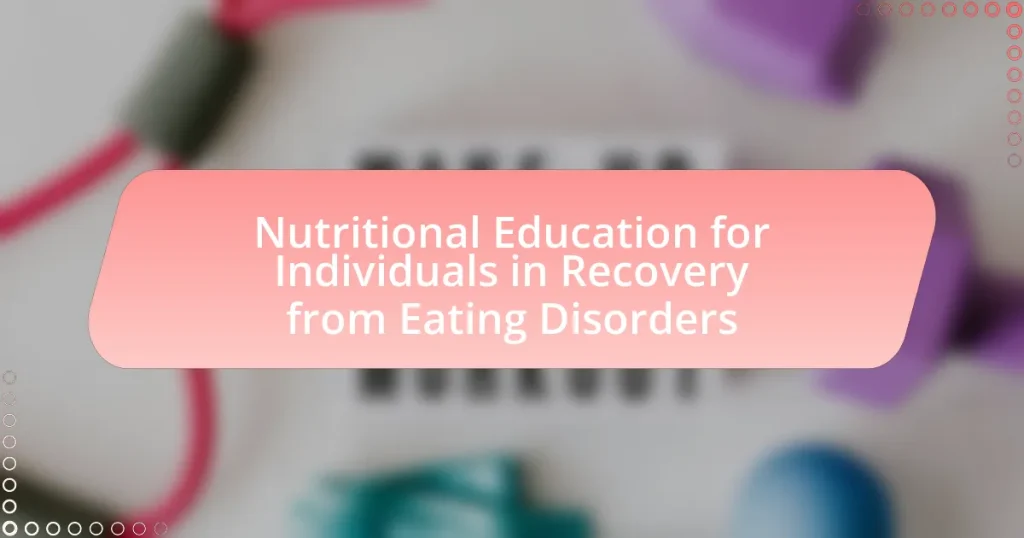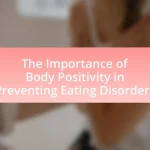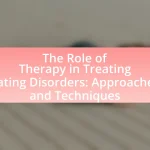Nutritional education for individuals in recovery from eating disorders is a critical component that focuses on teaching balanced diets, portion sizes, and the significance of nutrition for both physical and mental health. This education aims to help individuals rebuild a healthy relationship with food, understand their nutritional needs, and develop informed dietary choices, ultimately improving recovery outcomes. Key components include understanding balanced nutrition, recognizing hunger cues, and meal planning, while addressing challenges such as misinformation and emotional barriers. The article also highlights the role of dietitians, technology, and ongoing support systems in sustaining nutritional knowledge post-recovery, emphasizing the importance of individualized nutritional plans and healthy eating goals.
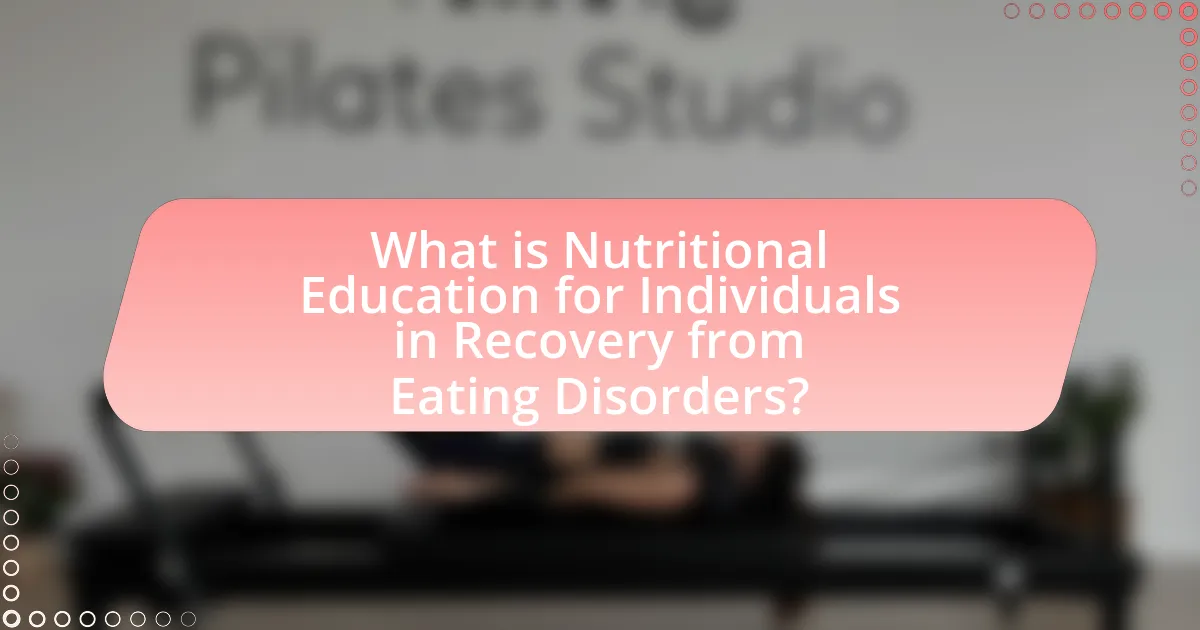
What is Nutritional Education for Individuals in Recovery from Eating Disorders?
Nutritional education for individuals in recovery from eating disorders involves teaching clients about balanced diets, portion sizes, and the importance of nutrition in physical and mental health. This education aims to help individuals rebuild a healthy relationship with food, understand their nutritional needs, and develop skills to make informed dietary choices. Research indicates that effective nutritional education can significantly improve recovery outcomes, as it addresses both the psychological and physiological aspects of eating disorders, promoting long-term health and well-being.
Why is nutritional education important for recovery from eating disorders?
Nutritional education is crucial for recovery from eating disorders because it equips individuals with the knowledge and skills necessary to make informed dietary choices. This education helps to dismantle harmful beliefs about food and nutrition, fostering a healthier relationship with eating. Research indicates that individuals who receive nutritional education during treatment show improved recovery outcomes, as they learn to understand the importance of balanced nutrition for physical and mental health. For instance, a study published in the Journal of Eating Disorders found that participants who engaged in nutritional counseling reported significant improvements in their eating behaviors and psychological well-being. Thus, nutritional education serves as a foundational component in the recovery process, promoting sustainable health practices and reducing the risk of relapse.
What role does nutrition play in the recovery process?
Nutrition plays a critical role in the recovery process from eating disorders by providing essential nutrients that restore physical health and support psychological well-being. Adequate nutrition helps to normalize body weight, replenish depleted energy stores, and improve metabolic functions, which are often disrupted in individuals with eating disorders. Research indicates that a balanced diet rich in vitamins, minerals, and macronutrients can enhance mood, reduce anxiety, and promote cognitive function, all of which are vital for effective recovery. For instance, a study published in the “Journal of Eating Disorders” found that individuals who received nutritional counseling alongside therapy showed significantly better recovery outcomes compared to those who did not. This underscores the importance of nutrition as a foundational element in the holistic treatment of eating disorders.
How can nutritional education support mental health during recovery?
Nutritional education can significantly support mental health during recovery by providing individuals with the knowledge and skills to make informed dietary choices that promote emotional well-being. Understanding the relationship between nutrition and mental health helps individuals recognize how specific nutrients, such as omega-3 fatty acids, B vitamins, and amino acids, can influence mood and cognitive function. Research indicates that a balanced diet can reduce symptoms of anxiety and depression, which are often prevalent in individuals recovering from eating disorders. For instance, a study published in the journal “Nutrients” found that dietary patterns rich in fruits, vegetables, and whole grains are associated with lower levels of depression and anxiety. By equipping individuals with this knowledge, nutritional education fosters healthier eating habits, enhances self-efficacy, and ultimately supports a more positive mental state during the recovery process.
What are the key components of nutritional education for recovery?
The key components of nutritional education for recovery from eating disorders include understanding balanced nutrition, recognizing hunger and satiety cues, and developing meal planning skills. Balanced nutrition involves educating individuals about macronutrients and micronutrients essential for physical and mental health, emphasizing the importance of a varied diet that includes carbohydrates, proteins, fats, vitamins, and minerals. Recognizing hunger and satiety cues helps individuals reconnect with their body’s signals, promoting a healthier relationship with food. Developing meal planning skills equips individuals with the ability to create structured eating patterns, which can reduce anxiety around food choices and foster consistency in their dietary habits. These components are supported by research indicating that comprehensive nutritional education can significantly improve recovery outcomes and enhance overall well-being in individuals recovering from eating disorders.
What types of nutrients are essential for individuals in recovery?
Individuals in recovery from eating disorders require essential nutrients such as proteins, carbohydrates, fats, vitamins, and minerals. Proteins are crucial for tissue repair and muscle rebuilding, while carbohydrates provide energy necessary for daily activities and brain function. Healthy fats support hormone production and nutrient absorption. Vitamins and minerals, including B vitamins, vitamin D, calcium, and iron, play vital roles in metabolic processes and overall health. Research indicates that a balanced intake of these nutrients can significantly improve recovery outcomes and support mental health, as evidenced by studies showing that adequate nutrition enhances mood and cognitive function in individuals recovering from eating disorders.
How can meal planning aid in the recovery process?
Meal planning can significantly aid in the recovery process from eating disorders by providing structure and promoting balanced nutrition. Structured meal planning helps individuals establish regular eating patterns, which can reduce anxiety around food choices and encourage a healthier relationship with eating. Research indicates that consistent meal patterns contribute to improved metabolic health and psychological well-being, essential factors in recovery. A study published in the Journal of Eating Disorders found that individuals who engaged in meal planning reported lower levels of disordered eating behaviors and improved emotional regulation. This evidence supports the notion that meal planning is a practical tool for fostering recovery and enhancing overall health.
What challenges do individuals face in nutritional education during recovery?
Individuals face several challenges in nutritional education during recovery from eating disorders, including misinformation about nutrition, emotional barriers, and lack of personalized guidance. Misinformation can stem from societal pressures and media portrayals that promote unhealthy eating habits, making it difficult for individuals to trust accurate nutritional information. Emotional barriers, such as anxiety and fear surrounding food, can hinder the ability to engage with educational materials effectively. Additionally, the absence of tailored nutritional guidance that considers individual needs and recovery stages can lead to confusion and frustration, ultimately impeding the recovery process. These challenges highlight the necessity for comprehensive, evidence-based nutritional education that addresses both the psychological and practical aspects of recovery.
How can emotional eating impact nutritional education?
Emotional eating can significantly hinder nutritional education by creating a disconnect between emotional states and healthy eating practices. When individuals use food as a coping mechanism for stress, anxiety, or other emotions, they may prioritize immediate comfort over nutritional value, leading to poor dietary choices. Research indicates that emotional eaters often struggle to recognize hunger cues and may consume foods high in sugar and fat, which can perpetuate unhealthy eating patterns. This behavior complicates the educational process, as it shifts the focus from understanding balanced nutrition to managing emotional triggers associated with food. Consequently, effective nutritional education must address the psychological aspects of eating to foster healthier relationships with food.
What barriers exist in accessing nutritional education resources?
Barriers to accessing nutritional education resources include lack of availability, financial constraints, and limited awareness. Many individuals, particularly those in recovery from eating disorders, may find that local resources are scarce or not tailored to their specific needs. Financial constraints can prevent access to paid programs or consultations, as many individuals may not have insurance coverage for nutritional education. Additionally, limited awareness of available resources can hinder individuals from seeking help, as they may not know where to find credible information or support. According to a study published in the Journal of Eating Disorders, these barriers significantly impact the ability of individuals in recovery to obtain necessary nutritional guidance, ultimately affecting their recovery process.

How can nutritional education be effectively implemented in recovery programs?
Nutritional education can be effectively implemented in recovery programs by integrating structured meal planning, individualized nutritional assessments, and ongoing support from trained professionals. Structured meal planning provides a clear framework for individuals to understand balanced nutrition, while individualized assessments help tailor educational content to specific needs, addressing unique dietary restrictions or preferences. Ongoing support from dietitians or nutritionists ensures that participants receive continuous guidance, reinforcing healthy eating habits and addressing challenges as they arise. Research indicates that programs incorporating these elements lead to improved dietary adherence and better recovery outcomes, as evidenced by a study published in the Journal of Eating Disorders, which found that participants receiving comprehensive nutritional education showed significant improvements in both psychological and physical health markers.
What strategies can be used to teach nutritional education?
Effective strategies to teach nutritional education include interactive workshops, personalized meal planning, and the use of visual aids. Interactive workshops engage participants through hands-on activities, fostering a deeper understanding of nutritional concepts. Personalized meal planning tailors education to individual needs, making it relevant and applicable, which is crucial for individuals recovering from eating disorders. Visual aids, such as food models and charts, enhance comprehension by providing clear, tangible representations of portion sizes and food groups. Research indicates that these methods improve knowledge retention and encourage healthier eating behaviors, particularly in vulnerable populations.
How can group therapy enhance nutritional education?
Group therapy can enhance nutritional education by providing a supportive environment where individuals can share experiences and learn from one another. This collective learning fosters accountability and motivation, which are crucial for adopting healthier eating habits. Research indicates that group therapy can improve knowledge retention and application of nutritional concepts, as participants engage in discussions that reinforce learning. For instance, a study published in the Journal of Eating Disorders found that group interventions significantly improved participants’ understanding of nutrition and their ability to make healthier food choices. This collaborative approach not only educates but also empowers individuals in recovery from eating disorders to implement nutritional changes effectively.
What role do dietitians play in recovery programs?
Dietitians play a crucial role in recovery programs by providing specialized nutritional guidance tailored to individuals recovering from eating disorders. They assess the nutritional needs of clients, develop personalized meal plans, and educate them about healthy eating habits to restore physical health and promote psychological well-being. Research indicates that dietitians help improve dietary intake and support weight restoration, which are essential components of recovery. For instance, a study published in the “International Journal of Eating Disorders” highlights that patients receiving dietetic support showed significant improvements in their nutritional status and overall recovery outcomes.
How can technology support nutritional education for individuals in recovery?
Technology can support nutritional education for individuals in recovery by providing accessible resources, personalized meal planning, and interactive learning tools. Mobile applications and online platforms offer tailored nutritional information and meal tracking, which can help individuals understand their dietary needs and make informed choices. For instance, studies show that mobile health interventions can improve dietary habits and increase knowledge about nutrition among individuals recovering from eating disorders. Additionally, virtual support groups and telehealth services facilitate communication with nutritionists and mental health professionals, enhancing the educational experience and promoting accountability in recovery.
What apps or tools are available for tracking nutrition?
Several apps and tools are available for tracking nutrition, including MyFitnessPal, Cronometer, Lose It!, and Noom. MyFitnessPal offers a comprehensive food database and allows users to log meals and track macronutrients. Cronometer focuses on micronutrient tracking and provides detailed nutritional information. Lose It! emphasizes weight loss with a user-friendly interface for meal logging. Noom combines nutrition tracking with behavioral psychology to support sustainable lifestyle changes. These tools are widely used and have been validated by numerous users for their effectiveness in managing dietary habits.
How can online resources provide support for nutritional education?
Online resources can provide support for nutritional education by offering accessible information, interactive tools, and community support tailored for individuals recovering from eating disorders. These resources include websites, apps, and online courses that deliver evidence-based dietary guidelines, meal planning tools, and educational articles that promote healthy eating habits. For instance, the National Eating Disorders Association (NEDA) offers a wealth of information on nutrition and recovery strategies, which can help individuals understand the importance of balanced diets and proper nutrition in their healing process. Additionally, online forums and support groups facilitate peer interaction, allowing individuals to share experiences and strategies, further enhancing their educational journey.
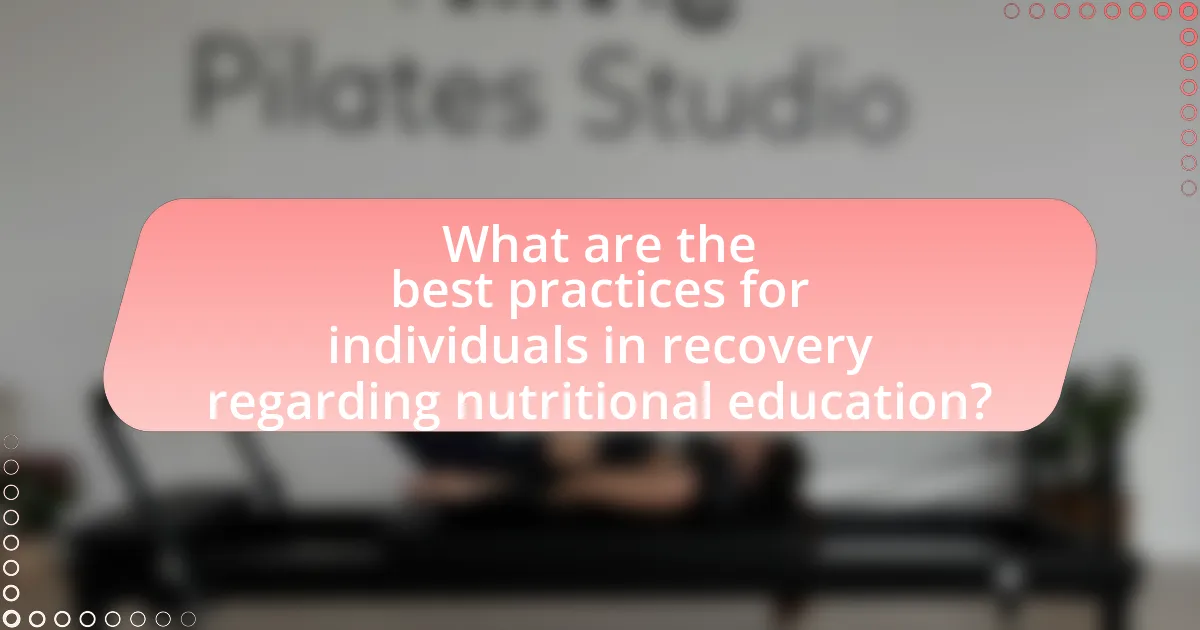
What are the best practices for individuals in recovery regarding nutritional education?
The best practices for individuals in recovery regarding nutritional education include understanding balanced nutrition, recognizing the importance of regular meals, and learning to listen to hunger cues. Balanced nutrition involves consuming a variety of foods from all food groups to ensure adequate intake of essential nutrients, which supports physical and mental health during recovery. Regular meals help stabilize blood sugar levels and reduce the risk of binge eating or restrictive behaviors, promoting a healthier relationship with food. Additionally, learning to listen to hunger cues encourages individuals to eat intuitively, fostering a more positive connection with their bodies and food choices. Research indicates that these practices can significantly improve recovery outcomes and overall well-being for individuals recovering from eating disorders.
What tips can help individuals apply nutritional education in daily life?
Individuals can apply nutritional education in daily life by incorporating meal planning, mindful eating practices, and utilizing food journals. Meal planning helps individuals organize their food choices, ensuring a balanced intake of nutrients, which is crucial for recovery from eating disorders. Mindful eating encourages awareness of hunger cues and promotes a healthier relationship with food, reducing the likelihood of binge eating or restrictive behaviors. Food journals serve as a reflective tool, allowing individuals to track their eating habits and emotional responses, which can identify patterns and triggers related to their eating behaviors. Research indicates that structured meal planning and mindful eating can significantly improve dietary habits and emotional well-being in individuals recovering from eating disorders.
How can individuals create a balanced meal plan?
Individuals can create a balanced meal plan by incorporating a variety of food groups, ensuring adequate intake of macronutrients and micronutrients. A balanced meal plan typically includes fruits, vegetables, whole grains, lean proteins, and healthy fats, which together provide essential vitamins, minerals, and energy. Research indicates that a diverse diet can improve overall health and support recovery from eating disorders by promoting nutritional adequacy and psychological well-being. For instance, the Dietary Guidelines for Americans recommend filling half the plate with fruits and vegetables, which supports this approach.
What are some healthy coping strategies related to nutrition?
Healthy coping strategies related to nutrition include mindful eating, meal planning, and incorporating a variety of nutrient-dense foods. Mindful eating encourages individuals to focus on their food, recognize hunger cues, and appreciate flavors, which can reduce emotional eating and promote a healthier relationship with food. Meal planning helps individuals prepare balanced meals in advance, reducing the likelihood of impulsive food choices that may not align with recovery goals. Incorporating a variety of nutrient-dense foods, such as fruits, vegetables, whole grains, and lean proteins, supports overall health and well-being, which is crucial for individuals recovering from eating disorders. Research indicates that these strategies can enhance nutritional knowledge and improve dietary habits, contributing to a more positive recovery experience.
What common misconceptions exist about nutrition in recovery?
Common misconceptions about nutrition in recovery from eating disorders include the belief that certain foods are inherently “bad” or “good,” which can lead to restrictive eating patterns. Many individuals mistakenly think that they must eliminate entire food groups to recover, ignoring the importance of balanced nutrition. Additionally, there is a misconception that weight gain is the sole indicator of recovery, while psychological and emotional healing is equally crucial. Research indicates that a holistic approach, which includes addressing both physical and mental health, is essential for effective recovery (Treasure et al., 2015, “The Role of Nutrition in the Treatment of Eating Disorders,” Journal of Eating Disorders).
How can understanding these misconceptions aid in recovery?
Understanding misconceptions about eating disorders can significantly aid in recovery by promoting accurate knowledge and reducing stigma. When individuals recognize that common beliefs—such as the idea that eating disorders are solely about food or that they only affect certain demographics—are false, they can better address the underlying psychological and emotional issues involved. Research indicates that education on these misconceptions leads to improved treatment outcomes, as individuals feel more empowered and less isolated. For instance, a study published in the Journal of Eating Disorders found that increased awareness of the complexities of eating disorders correlates with higher rates of recovery and lower relapse rates. Thus, understanding these misconceptions not only fosters a supportive environment but also enhances the effectiveness of recovery strategies.
What is the importance of individualized nutritional plans?
Individualized nutritional plans are crucial for effectively addressing the unique dietary needs of individuals recovering from eating disorders. These plans take into account personal health conditions, nutritional deficiencies, and psychological factors, ensuring that each individual receives tailored support that promotes recovery. Research indicates that personalized nutrition can lead to better adherence to dietary recommendations, improved mental health outcomes, and a greater likelihood of sustained recovery from eating disorders. For instance, a study published in the Journal of Eating Disorders found that individuals who followed customized meal plans reported higher satisfaction and lower anxiety levels compared to those on generic diets. This evidence underscores the significance of individualized approaches in fostering a supportive and effective recovery process.
How can individuals maintain their nutritional education after recovery?
Individuals can maintain their nutritional education after recovery by engaging in continuous learning through various resources such as workshops, online courses, and support groups focused on nutrition. These educational opportunities provide updated information on balanced diets, portion control, and healthy eating habits, which are essential for long-term recovery. Research indicates that ongoing education helps reinforce knowledge and skills, reducing the risk of relapse in individuals recovering from eating disorders. For instance, a study published in the Journal of Eating Disorders highlights that participants who attended regular nutritional workshops reported improved dietary habits and a stronger understanding of nutrition.
What ongoing support systems can help sustain nutritional knowledge?
Ongoing support systems that can help sustain nutritional knowledge include structured educational programs, peer support groups, and access to registered dietitians. Structured educational programs, such as workshops and online courses, provide continuous learning opportunities about nutrition, which is essential for individuals recovering from eating disorders. Peer support groups facilitate shared experiences and knowledge, reinforcing nutritional concepts through discussion and encouragement. Access to registered dietitians ensures personalized guidance and accountability, helping individuals apply nutritional knowledge effectively in their daily lives. Research indicates that these support systems significantly enhance long-term adherence to healthy eating practices, as evidenced by studies showing improved outcomes in individuals who engage in ongoing nutritional education and support.
How can individuals continue to set healthy eating goals post-recovery?
Individuals can continue to set healthy eating goals post-recovery by establishing specific, measurable, achievable, relevant, and time-bound (SMART) objectives. This structured approach allows individuals to create clear and attainable goals, such as incorporating a variety of food groups into their diet or planning meals ahead of time. Research indicates that goal-setting can enhance motivation and adherence to healthy eating patterns, as evidenced by a study published in the Journal of Nutrition Education and Behavior, which found that participants who set SMART goals were more successful in maintaining dietary changes over time. By regularly reviewing and adjusting these goals, individuals can ensure they remain aligned with their evolving needs and preferences, fostering a sustainable approach to healthy eating.
